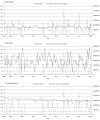Associations between tobacco control mass media campaign expenditure and smoking prevalence and quitting in England: a time series analysis
- PMID: 28667091
- PMCID: PMC6047146
- DOI: 10.1136/tobaccocontrol-2017-053662
Associations between tobacco control mass media campaign expenditure and smoking prevalence and quitting in England: a time series analysis
Abstract
Background: It has been established that mass media campaigns can increase smoking cessation rates, but there is little direct evidence estimating associations between government expenditure on tobacco control mass media campaigns and smoking cessation. This study assessed the association over 8 years between mass media expenditure in England and quit attempts, smoking cessation and smoking prevalence.
Methods: Autoregressive integrated moving average modelling with exogenous variables (ARIMAX) was applied to monthly estimates from the Smoking Toolkit Study between June 2008 and February 2016. We assessed the association between the trends in mass media expenditure and (1) quit attempts in the last two months, (2) quit success among those who attempted to quit and (3) smoking prevalence. Analyses were adjusted for trends in weekly spending on tobacco by smokers, tobacco control policies and the use of established aids to cessation.
Results: Monthly spending on mass media campaigns ranged from nothing to £2.4 million, with a mean of £465 054. An increase in mass media expenditure of 10% of the monthly average was associated with a 0.51% increase (of the average) in success rates of quit attempts (95% CI 0.10% to 0.91%, p=0.014). No clear association was detected between changes in mass media expenditure and changes in quit attempt prevalence (β=-0.03, 95% CI -2.05% to 2.00%, p=0.979) or smoking prevalence (β=-0.03, 95% CI -0.09% to 0.03%, p=0.299).
Conclusion: Between 2008 and 2016, higher monthly expenditure on tobacco control mass media campaigns in England was associated with higher quit success rates.
Keywords: ARIMA; campaigns; mass media; smoking prevalence; time-series; tobacco control.
© Article author(s) (or their employer(s) unless otherwise stated in the text of the article) 2018. All rights reserved. No commercial use is permitted unless otherwise expressly granted.
Conflict of interest statement
Competing interests: RW undertakes consultancy and research for and receives travel funds and hospitality from manufacturers of smoking cessation medications (Pfizer, J&J and GSK) but does not take funds from e-cigarettes manufacturers or the tobacco industry. EB and JB have received unrestricted research funding from Pfizer. EB and JB are funded by CRUK. EB is also funded by NIHR’s SPHR and JB by the Society for the Study of Addiction. MK has no competing interests to declare.
Figures


References
-
- World Health Organization. Framework convention on tobacco control. Geneva: World Health Organization, 2003.
Publication types
MeSH terms
Grants and funding
LinkOut - more resources
Full Text Sources
Other Literature Sources
Medical
